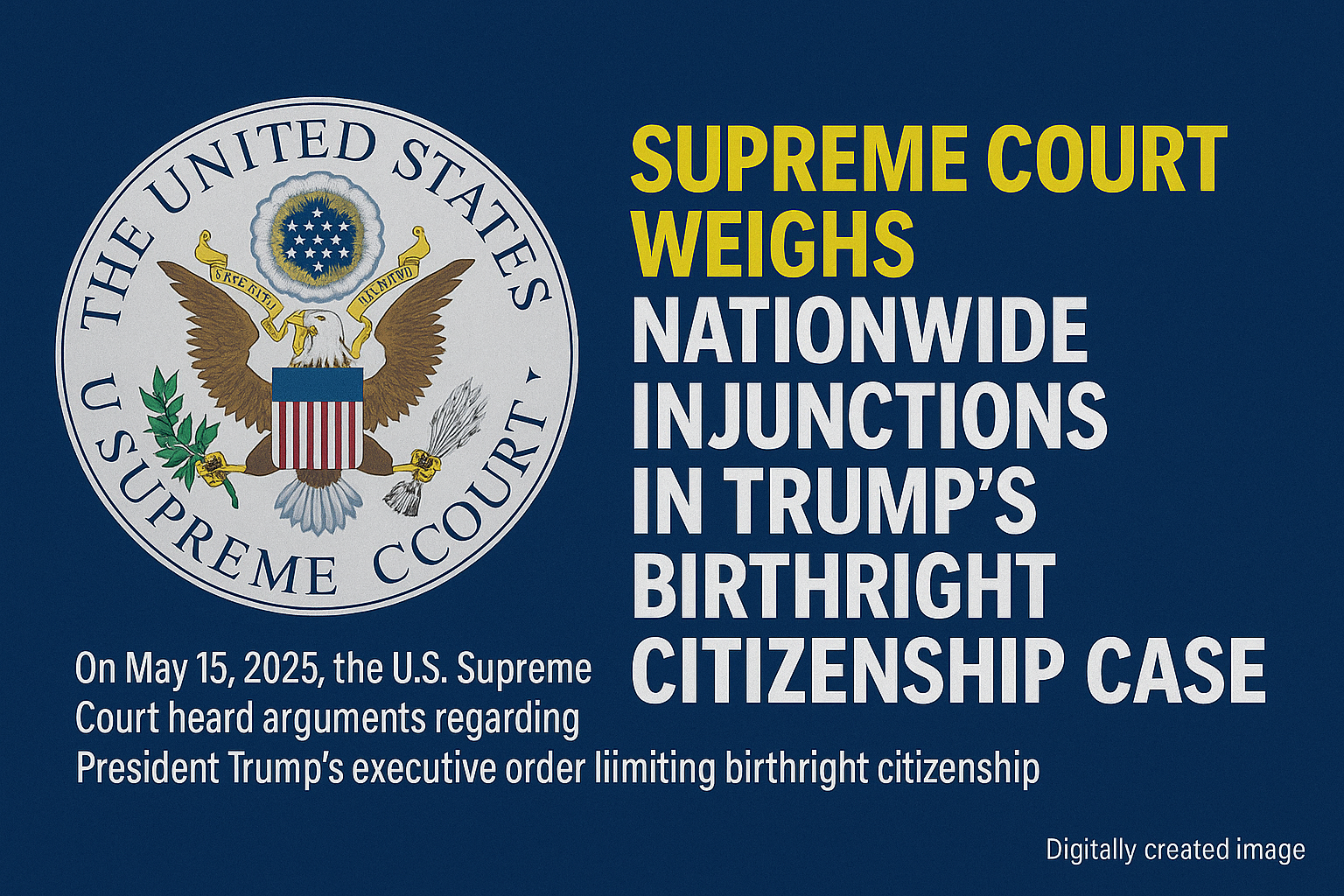KEY POINTS
- On May 15, 2025, the U.S. Supreme Court heard arguments regarding President Trump’s executive order limiting birthright citizenship.
- The case focuses on the validity of nationwide injunctions issued by federal courts to block the order.
- Conservative justices questioned the authority of single district judges to issue nationwide injunctions.
- Liberal justices expressed concerns about inconsistent citizenship policies across states.
- A decision is expected by late June or early July 2025, potentially impacting over 150,000 newborns annually.
WASHINGTON, D.C. — May 16, 2025 | Virginia Times
On May 15, 2025, the U.S. Supreme Court heard oral arguments in a pivotal case concerning President Donald Trump’s executive order issued on January 20, 2025. The order seeks to limit birthright citizenship for children born in the United States to undocumented immigrants or temporary visa holders. The primary focus of the case is the legitimacy of nationwide injunctions issued by federal district courts that have blocked the enforcement of the order.
Case Background
The 14th Amendment of the U.S. Constitution guarantees citizenship to “all persons born or naturalized in the United States, and subject to the jurisdiction thereof.” This clause has traditionally been interpreted to grant citizenship to nearly everyone born on U.S. soil, as affirmed in the 1898 Supreme Court decision United States v. Wong Kim Ark. President Trump’s executive order challenges this interpretation by directing federal agencies to deny citizenship to children of undocumented immigrants, arguing they are not “subject to the jurisdiction” of the U.S.
Four federal district courts—in Maryland, Massachusetts, Washington, and New Hampshire—issued nationwide injunctions to halt the order, citing its conflict with the 14th Amendment. The Trump administration, represented by Solicitor General D. John Sauer, appealed to the Supreme Court, seeking to limit these injunctions to the plaintiffs involved, allowing the policy to take effect in other states.
Oral Arguments
During the oral arguments, the justices concentrated on the scope of nationwide injunctions rather than the executive order’s merits. Conservative justices, including Chief Justice John Roberts and Justice Brett Kavanaugh, questioned the authority of single district judges to block policies nationwide, noting that such injunctions were rare before the 1960s. Liberal justices, like Elena Kagan and Ketanji Brown Jackson, warned that restricting injunctions could lead to a fragmented system where citizenship varies by state, undermining the 14th Amendment’s uniformity.
— Justice Sonia Sotomayor
New Jersey Attorney General Matthew Platkin, representing 18 Democratic-led states, argued that the order exceeds executive authority and violates constitutional protections. The administration countered that nationwide injunctions encourage “judge shopping” and disrupt governance, suggesting class-action lawsuits as an alternative.
Potential Impact
If the Court restricts nationwide injunctions, the policy could take effect in 28 states not involved in the lawsuits, potentially affecting over 150,000 newborns annually. This could create logistical challenges for benefits, immigration enforcement, and record-keeping. The Court is unlikely to rule on the order’s constitutionality now, as the appeal centers on injunctions.
— Kelsi Corkran, Supreme Court director at the Institute for Constitutional Advocacy & Protection
Analysis
The debate reflects tension between executive power and judicial oversight. The administration’s focus on injunctions, rather than defending the order’s legality, suggests its constitutional weaknesses, as most legal scholars view it as conflicting with established precedent. The case could set a precedent for how courts handle executive actions, balancing constitutional protections with judicial restraint.
A decision from the Supreme Court is anticipated by late June or early July 2025, which could reshape both citizenship policy and judicial authority in the United States.
A global media for the latest news, entertainment, music fashion, and more.














